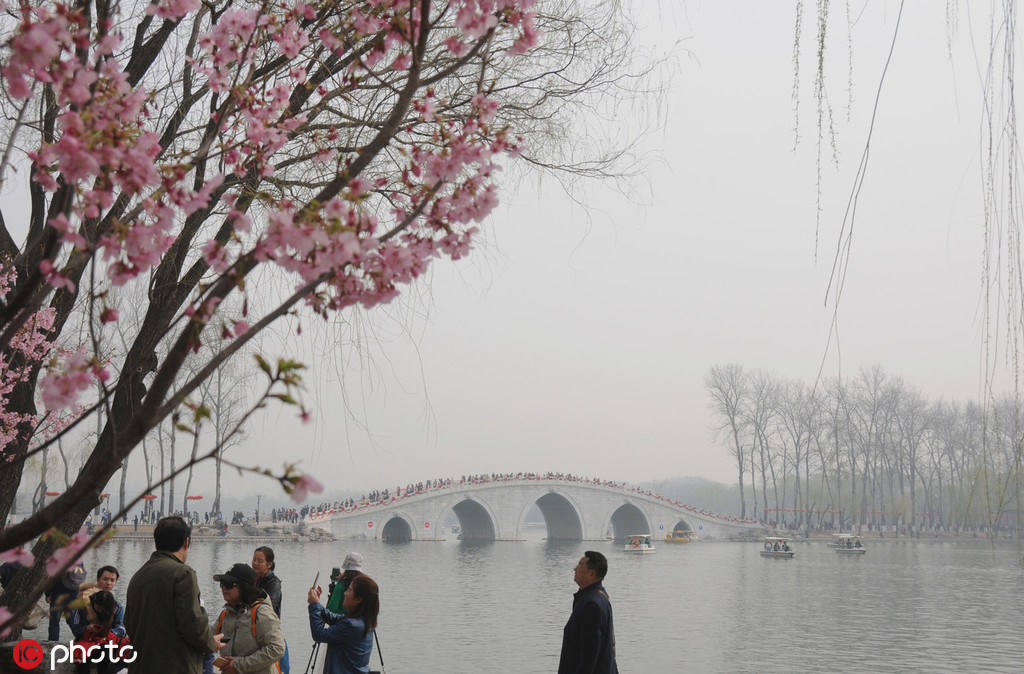Why is air pollution worse in places? Inspectors in new round will find out


China's top environmental watchdog will soon launch a new round of air pollution control inspections that will involve its entire staff, as some cities in northern China saw deteriorating air quality in the first quarter of this year.
While unfavorable meteorological conditions are partly to blame for the lack of dispersal, the watchdog said that cannot be used as an excuse for excessive emissions and officials will be severely punished for their failure to fulfill their duties.
Cao Liping, head of the bureau of ecological and environmental supervision at the Ministry of Ecology and Environment, said 19,500 environmental officers across the country were mobilized in the yearlong air pollution inspection that concluded on Sunday and primarily covered the 28 major cities in the Beijing-Tianjin-Hebei province cluster and the 11 major cities in Fenhe-Weihe River Plain area.
While inspectors found 52,000 environmental violations and referred them to local governments, they also reviewed the 38,900 violations unveiled in the first round of the inspections to check progress, he told a news conference on Monday.
"All the violations have been put on record and will be watched until they are properly rectified," Cao said.
Though the inspections have helped many areas address key problems, the air pollution control situation remains grim, with many hard nuts to crack, he said.
The average density of PM2.5 particulate matter in 337 major cities across the country in the first quarter this year stood at 54 micrograms per cubic meter, up by 1.9 percent year-on-year, the ministry said.
The Beijing-Tianjin-Hebei region saw its PM2.5 density rise by 8.4 percent, while the Fenhe-Weihe River Plain area, most of which is located in Shanxi and Shaanxi provinces, experienced a concentration increase of 9.2 percent, it said.
The effort to control air pollution will not be relaxed, and a new round of inspections will be launched on May 8, Cao added.
This time, he said, inspectors will be dispatched to each of the 39 major cities, with each consisting of officials from one of the ministry's departments, affiliated institutes and provincial environmental watchdogs. They will be led by an official equivalent to a county head.
Previously, the inspection teams may not have included officials from the ministry and the provincial environmental departments and were often headed by lower-level officials. Many of the team members were grassroots law enforcement officers, who were dispatched out of their home areas for the inspection work.
Cao didn't say how many officers will be involved in the coming inspections but said all staff members of the ministry will have to participate in at least one inspection lasting for about two weeks.
Some cities have seen their PM2.5 concentration rebound because of unfavorable dispersal conditions in the atmosphere - for example, weak cold air fronts caused by an El Nino event warming the Pacific Ocean - and because some local governments relaxed their efforts after gaining ground. Yet there has been rapid improvement in the country's overall air quality, said Liu Youbin, the ministry's spokesman, citing Beijing as an example.
The frequency of heavy air pollution events, the scope of the area affected and the density of major pollutants have all decreased sharply in recent years, he said.
He added, however, that with air pollutant discharges remaining high, air quality remains tied to meteorological conditions. Some experts estimate those conditions could annually increase or decrease PM 2.5 concentration by up to 10 percent, or even by 15 percent in some cities. Monthly, the range could be more than 30 percent.
"The meteorological conditions, however, are no excuse if the governments of the key cities fail to fulfill their duties," he said.
- China unveils first AI model to gauge weather's impact on stock market
- Tianjin launches youth program to cultivate university talent for tech market
- Local farmers combat desertification in Moyu county of Xinjiang
- N China's Hohhot launches winter amusement programs to boost local economy
- Viral app bares 'safety anxiety' among solo dwellers
- Research suggests causes of moon's two different 'faces'





































